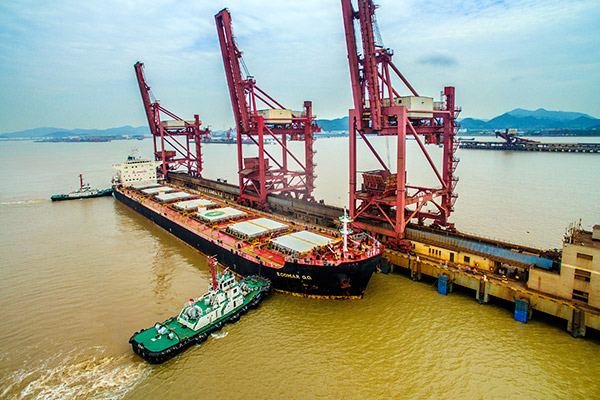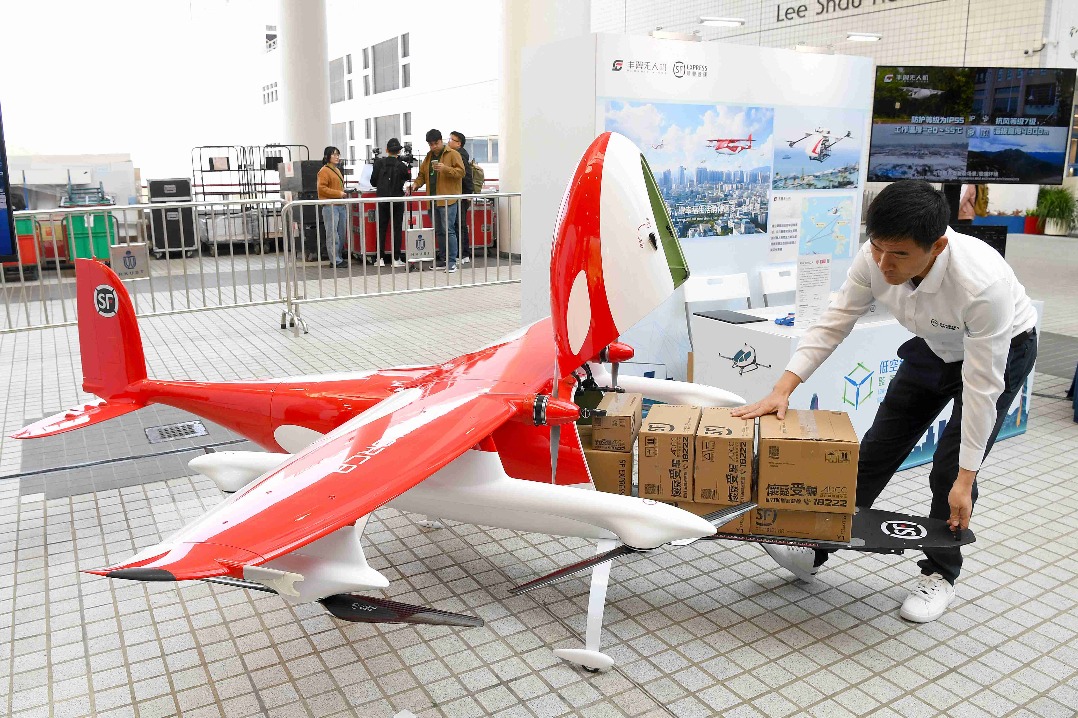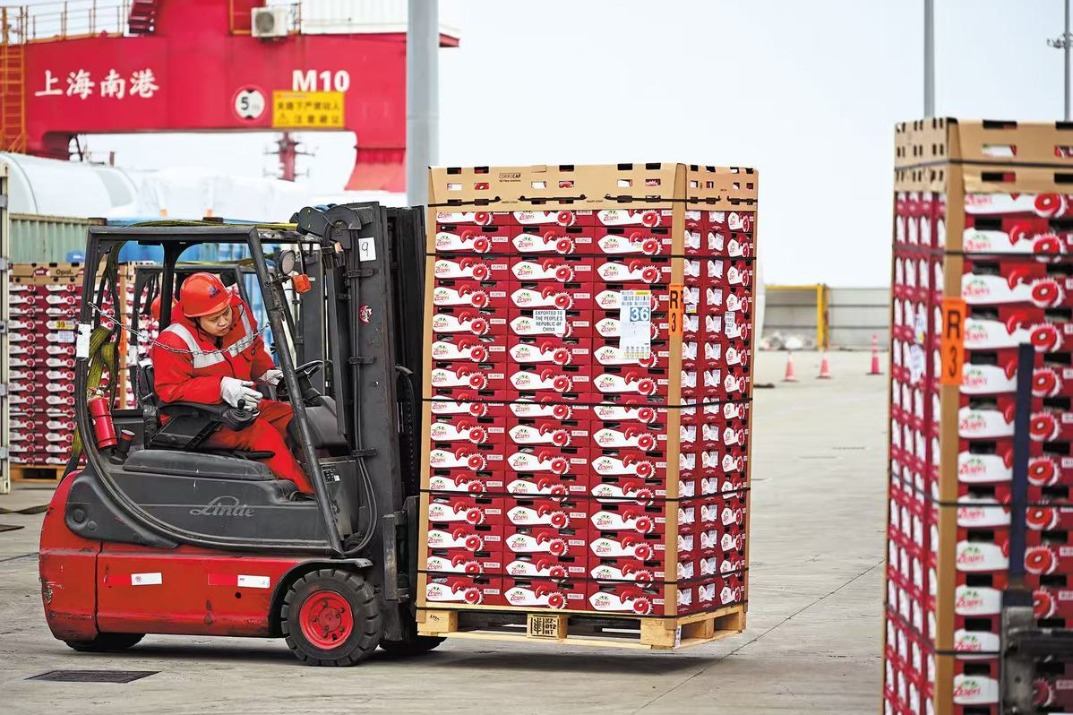Trade rows dispirit head of largest bean processor in North America


Chippewa Valley founder says similar tensions in 1930 had led to Great Depression
MADISON, the United States-In her whole life, Cindy Brown, 62, a leading kidney bean processor in the midwestern state of Wisconsin, has never felt such a strong sense of "uncertainty".
Her family-run business has been thrown into disarray since the European Union, her major export market, added extra tariffs on imports of US goods in June, to retaliate against the US trade tariffs. The kidney bean is on the EU's target list.
"We have 60 loads of products (roughly 1,200 metric tons in total) that should have shipped last month and are not going to ship," the second-generation kidney bean grower and processor said in an interview on July 26.
"The uncertainty is the worst part," Brown said.
As the largest red kidney bean processing company in North America, Chippewa Valley Bean, a Wisconsin-based family business with an annual output of 45,000 tons, exports 60 percent of its products to Europe.
"This year we expected to do $25 million worth of business with the European Union," said Brown in her office. "Of course, that's before the tariff."
Following the US tariffs on imported steel and aluminum, the EU, along with other countries, retaliated by imposing tariffs on products worth about $3.4 billion, ranging from industrial goods to agricultural products.
Brown's red kidney bean was among the targeted goods, which was asked to pay an extra 25-percent tariffs starting from June 22.
"That was a deal breaker," said Brown with a frown on her face.
Owing to the extra cost, a large portion of the company's done deals have been put in jeopardy.
"About 20 percent (of the European buyers) at this point have said, 'nope, not going to take it'," said Brown. "The majority of them just stood back and said, 'let's see what happens'."
Located at the suburb of Menomonie, a small town in midwestern Wisconsin surrounded by extensive lands of crops, Chippewa Valley Bean plant was rather quiet these days, with two basketball field-sized warehouses stuffed with piles of bags of processed red kidney beans.
"Normally, there would be trucks coming in and out of here all day," Russell Doane, Brown's father who founded the company in 1969, said.
"And that's not true today. We hope that it will ultimately be solved," the 87-year-old said.
But for Charles Wachsmuth, Brown's son who joined the family business six years ago, the damage could be permanent if there is no swift removal of the tariffs.
"If the tariffs are still in effect in February, March (next year) ... we will see regions that don't traditionally do dark red kidney beans start to play the kidney beans," the third-generation grower who is in charge of the company's market development said.
It could be newcomers from East Africa or Ukraine, or more production in South America, Wachsmuth said. "Once somebody starts to grow crop, you can't stop them."
To honor the signed contracts, some buyers have suggested splitting the burden evenly with Chippewa Valley Bean, but even that has not proved to be a workable solution.
"Our profit margins aren't that high," Brown said. "If we were to pay half of that tariff, there wouldn't need to be a Chippewa Valley Bean next year."
Selling products to the domestic market was beyond consideration, too. "We produce far too much for our US consumption," said Brown.

Meanwhile, as a result of the "rippling effect", the uncertainty in Brown's business will soon be passed on to the upstream in the supply chain.
Over 100 red kidney bean growers providing raw materials for the company, which are spread throughout the midwestern states like Minnesota, North Dakota, South Dakota and Wisconsin, will begin to feel the pain.
"We have to reduce our grower prices to help pay for a portion of this (tariffs)," Brown said.
When the prospect remains dim, a glimpse of hope has appeared. On July 25, US President Donald Trump spoke with Jean-Claude Juncker, president of the European Commission, and the two agreed to suspend new tariffs and negotiate trade practices to shun a trade war.
However, the news did not cheer up the deeply troubled family. "We have no idea how long it will take, where it's going," Brown said.
"I do know that the European Trade Commission has not taken kidney beans off their list."
In another attempt to mitigate pains felt by farmers, the Trump administration on July 24 announced a $12 billion aid plan, which unsurprisingly got a cool reception nationwide.
In response, US farmers cried out: "We want trade, not aid." Chippewa Valley Bean shared the prevailing opinion.
Just a one-time aid certainly could not solve our problem, said Tom Kwak, the operations director of Chippewa Valley.
Besides, Brown questioned where the US government could get the money needed.
"And that's just only for this year. That's not for next year," Brown said. "It's not sustainable."
Born in 1931, Doane has experienced the aftermath of the Great Depression in the 1930s. For him, the trade tariffs ordered by Trump claiming to protect US businesses and farmers made him recall the implementation of the Smoot-Hawley bill in 1930.
The bill raised US tariffs on over 20,000 imported goods. It was signed by then US President Herbert Hoover and has been seen by many as exacerbating the US recession into a worldwide depression.
"That tariff bill was designed to protect American jobs," said Doane. "It had the opposite effect."




































